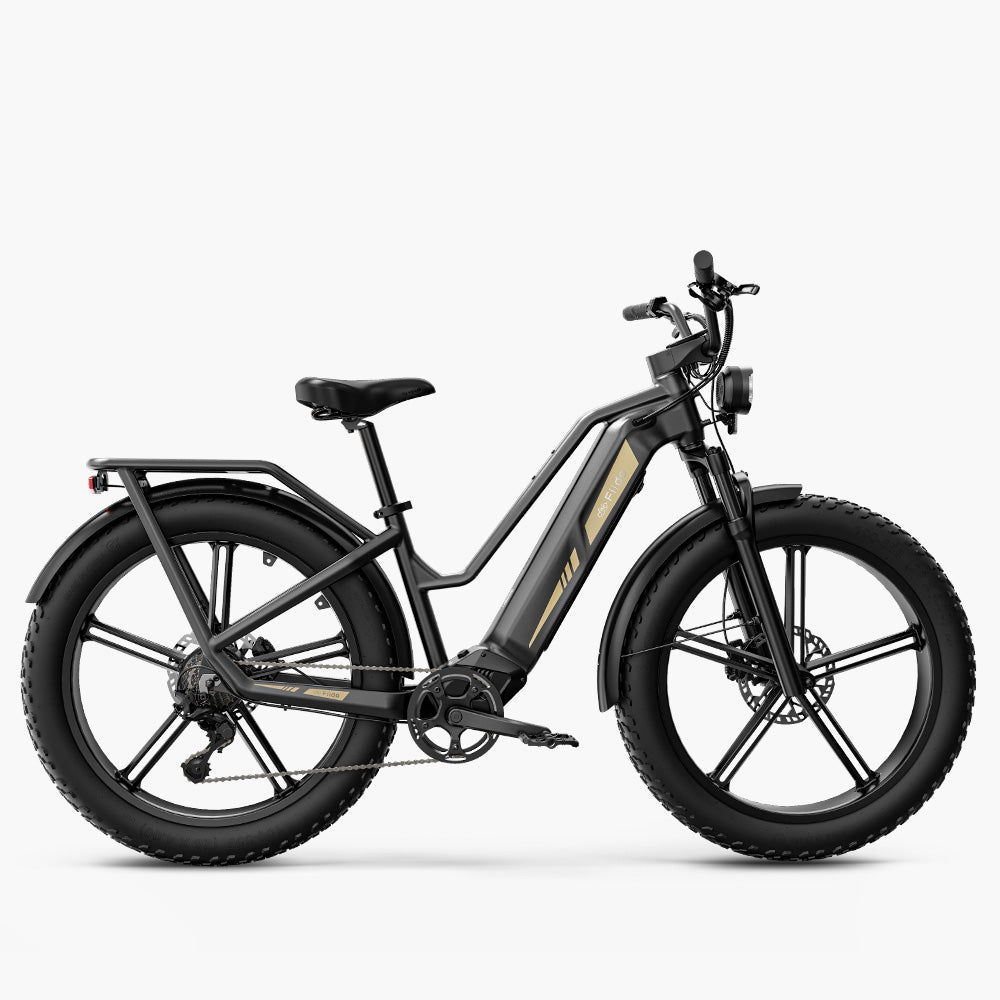E-bike tire repair is one of those essential skills every electric bike rider should learn. Electric bikes (or e-bikes) offer a smooth and fast ride, but like any bike, they’re not immune to punctures and flat tires. Whether you're on a quiet city ride or a rougher trail, an e-bike tire puncture can happen unexpectedly. Knowing how to fix an e-bike tire yourself not only saves time and money but also keeps you from being stranded. In this guide, we’ll walk you through the process of e-bike tire repair, introduce the best tools for the job, and offer some advice on how to handle a flat tire situation while out on the road.

Understanding the Basics of E-bike Tire Repair
E-bike tires are similar to regular bike tires, but because they handle the extra weight of the electric motor and battery, they tend to wear out faster and are more prone to punctures. So, it’s crucial to keep them in good condition. Electric bike tire maintenance is key to avoiding flat tires, but when they do happen, you’ll need to know how to tackle the issue.
The process of fixing an e-bike tire is not that different from repairing a standard bike tire, but there are a few things you need to keep in mind because of the added weight and the potential complications with the electric motor.
Common E-bike Tire Problems
E-bike tires, due to their constant exposure to the elements and the added weight of the electric system, are subject to a variety of common issues. Some of these include:
Punctures from road debris: Sharp objects like glass, nails, and thorns can easily puncture your tires.
Worn-out tread: Over time, the rubber on your tires will wear down, making them more susceptible to flats and less effective in terms of grip.
Under-inflation: Riding with tires that are too soft not only increases the likelihood of punctures but also affects your bike's performance.
Misaligned tires: If your wheels are not properly aligned, it can cause uneven wear on the tires.
How to Fix an E-bike Tire
If you notice that your e-bike tire is flat, the first thing you should do is inspect the tire for any visible damage like nails, glass, or sharp objects lodged in the rubber. If the puncture is small, you might be able to repair it on the spot. Here’s a quick rundown of what you’ll need and how to do it:
Deflate the tire completely using the valve stem. This will make it easier to remove the tire from the rim.
Remove the tire from the wheel. Depending on the type of bike, this might involve detaching the wheel from the bike’s frame.
Locate the puncture by either visually inspecting the tire or submerging it in water to look for bubbles.
Patch the puncture using an e-bike tire repair kit or replace the inner tube if the puncture is too large.
Reinstall the tire and inflate it to the recommended pressure.
Tools and Kits for Quick DIY E-bike Tire Repairs
If you’re planning to repair your e-bike tire yourself, having the right tools on hand can make all the difference. Best tools for e-bike tire repair include:
Tire levers: These help you remove the tire from the rim without damaging it.
Patch kit or replacement inner tube: A basic patch kit includes adhesive and rubber patches to cover small holes in the tire. For larger holes, replacing the inner tube is often the better option.
Portable pump: A hand-held pump or a CO2 inflator to quickly refill your tire once the repair is done.
Multi-tool: Includes essential bike tools like screwdrivers and wrenches to help with adjustments.
For a smoother experience, you might want to invest in a complete ebike tire repair kit, which usually comes with all of the above tools.
E-bike Flat Tire Solutions: What to Do if You’re on the Road
So, what should you do if you find yourself with a flat tire halfway through a ride? The first step is to remain calm. While it’s not ideal, DIY e-bike tire repair on the road is totally doable. Make sure you always have a basic repair kit and a pump with you when riding long distances. If your tire goes flat, pull over in a safe spot and follow these steps:
Get the bike off the road to a safe place where you have room to work.
Check for the puncture and see if it’s something that can be fixed right away. Use a patch kit if necessary.
Inflate the tire using your portable pump, ensuring the tire pressure is at the recommended level.
Ride cautiously back home or to the nearest repair shop if you're unsure about the patch holding up for the entire ride.
If the puncture is too big to patch or you don’t have the right tools, call for assistance or find a local bike shop.

E-bike Inner Tube Replacement
Sometimes, fixing a tire puncture with a patch isn’t enough. If you’re dealing with a large hole or a severely worn-out inner tube, e-bike inner tube replacement is the only real solution. Replacing the inner tube is a relatively simple process:
Remove the wheel from the bike and deflate the tire.
Take off the tire and pull out the damaged inner tube.
Inspect the tire for any remaining sharp objects.
Insert a new inner tube, making sure it sits properly inside the tire.
Inflate the tire to the proper pressure and reattach the wheel.
While replacing the inner tube might take a little more time than patching, it’s a more permanent solution, especially if you're dealing with multiple punctures.
What if Your e-bike Tires are Tubeless?
If your e-bike tires are tubeless, the repair process is slightly different but can still be managed with some basic tools and knowledge. Tubeless tires are popular because they tend to resist flats better than traditional tube-based tires, but they are not completely immune to punctures. When a tubeless tire gets a puncture, the sealant inside should automatically fill small holes. However, larger punctures might require a bit more work.
Here’s what you need to know about tubeless e-bike tire repair:
How to Fix a Tubeless E-bike Tire
Check for the puncture: First, locate the puncture by either inspecting the tire visually or by submerging the tire in water and looking for bubbles if it's difficult to spot.
Let the tire deflate: If the sealant isn’t sealing the puncture, allow the air to escape completely so you can work on the tire without pressure inside.
Clean the puncture site: Clear the punctured area of any sharp objects, such as nails or glass, to ensure there’s nothing left inside that could further damage the tire.
Use a tubeless tire plug: For larger punctures, a tubeless tire plug is often the best solution. Tubeless plugs (sometimes called "worms" or "bacon strips") are sticky rubber strips that you push into the hole using a specialized tool.
Reinflate the tire: After plugging the hole, use a portable pump or CO2 inflator to refill the tire with air. Make sure to monitor the air pressure to ensure it’s within the manufacturer’s recommended range.
Check for leaks: Once the tire is inflated, listen for any air leaks. If the plug is holding, you should be ready to ride again. If you still hear air escaping, you may need to add more sealant or reapply the plug.
Tools You’ll Need for Tubeless Tire Repair
When dealing with tubeless tires, the tools are slightly different from traditional tube-based tire repair. Here’s what you should carry for tubeless e-bike tire repair:
Tubeless tire plugs: These are crucial for filling larger holes that the sealant can’t handle on its own.
Plug insertion tool: This tool allows you to insert the plug into the tire.
Tire sealant: Always carry a small bottle of tire sealant for emergencies. The sealant is responsible for closing small punctures as you ride.
Portable air pump or CO2 inflator: Essential for reinflating your tire after the repair.
What If the Sealant Fails?
If the tire sealant doesn’t seal the puncture or you’ve used a plug and it still leaks, you may have to add more sealant or recheck the tire for additional punctures. In extreme cases, when neither the plug nor sealant works, replacing the tire might be necessary.
For everyday riders, regularly checking the amount of sealant inside your tires is a good idea. Over time, the sealant can dry out, making it less effective. Replacing or refilling it periodically will ensure that your tubeless tires remain puncture-resistant.
Best Practices for E-bike Tire Maintenance
Regular electric bike tire maintenance is essential for ensuring a smooth ride and avoiding breakdowns. Make a habit of:
Inspecting your tires regularly for signs of wear and tear.
Keeping your tires properly inflated according to the manufacturer’s recommended pressure. Underinflated tires can lead to more frequent flats and decreased performance.
Checking for alignment issues that may cause uneven tire wear.
By following these steps, you’ll extend the life of your tires and enjoy a much safer ride.
Best Tools for E-bike Tire Repair
To repair your ebike tire efficiently, you’ll need a few essential tools. As mentioned earlier, tire levers, patch kits, portable pumps, and multi-tools are key to getting back on the road quickly. You might also want to check out Fiido’s e-bike accessories, which offer a great range of repair tools and replacement parts. For example, Fiido’s inner tube sets are specifically designed for ebikes, providing you with reliable tools that can handle the extra demands of electric bike tires.
Best E-bikes For Handling Rough Terrains And Reducing The Chances Of Punctures
Here are a few Fiido fat bikes known for their large, puncture-resistant tires, perfect for handling rough terrains and reducing the chances of punctures:
Fiido M1 Pro: Fiido M1 Pro fat tire electric bike is an all-terrain fat tire ebike with a 20” x 4” tire size, providing great stability and grip on various surfaces. The larger tires help reduce the risk of punctures while ensuring a smooth ride on rough trails or uneven city streets.
Fiido M1 Pro Fat Tire Electric Bike
The most cost-effective fat tire ebike for off-road adventures.
Fiido Titan: The Fiido Titan Robust Cargo Electric Bike, features large, durable fat tires that are ideal for reducing the risk of punctures. Its robust design and cargo capabilities make it a great option for both daily commutes and heavy-duty use on rugged terrains, further minimizing the chances of tire damage while ensuring a stable ride.
Fiido Titan Robust Cargo Electric Bike
248 Miles range, fat tire & 4-piston brakes, hunting e-bike&fishing e-bike.
These Fiido fat bikes are designed for durability and toughness, making them an excellent choice for riders looking to minimize the risk of punctures while enjoying various terrains.
FAQs About E-bike Tire Repair
1. What tools do I need for DIY ebike tire repair?
To fix an ebike tire, you'll need tire levers, a patch kit or spare inner tube, a portable pump, and a multi-tool.
2. How often should I check my ebike tire pressure?
It's a good idea to check your tire pressure before each ride. Keeping your tires properly inflated can prevent flats and improve performance.If you want to learn more about tire pressure, you can check out our article:Ebike Tire Pressure Best Practices for Maintaining The Right Tire Pressure
3. Can I ride my ebike with a patched tire?
Yes, a patched tire can be ridden, but make sure the patch is properly applied and the tire is fully inflated before continuing your ride.
4. What’s the best solution for a flat ebike tire during a ride?
If you’re on the road and experience a flat, use a patch kit or replace the inner tube. Always carry a small repair kit with you when riding.
5. Are ebike tires different from regular bike tires?
E-bike tires are similar to regular bike tires but are typically built to withstand more wear and tear due to the added weight of the motor and battery.
The information provided in this guide is for general reference only. Always exercise caution when performing bicycle maintenance and consult a qualified mechanic if you encounter complex problems or are unsure about any part. The tools and techniques mentioned may vary depending on the type and model of electric bicycle.















